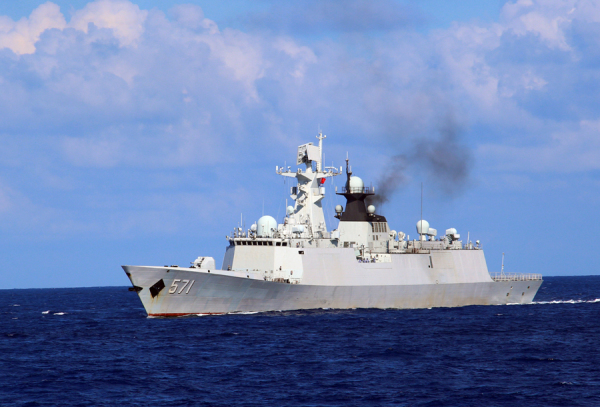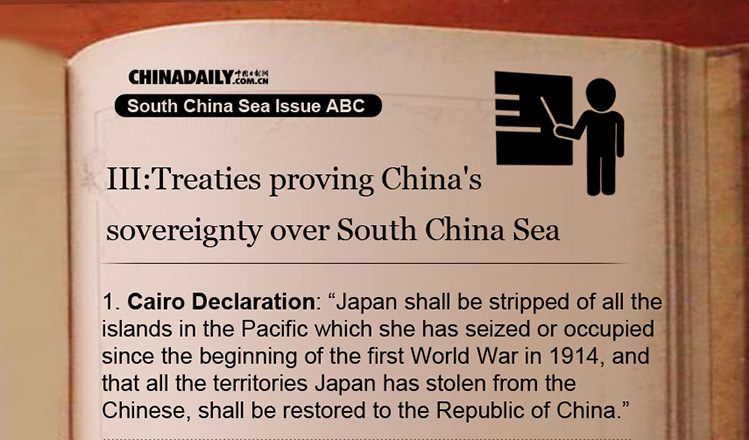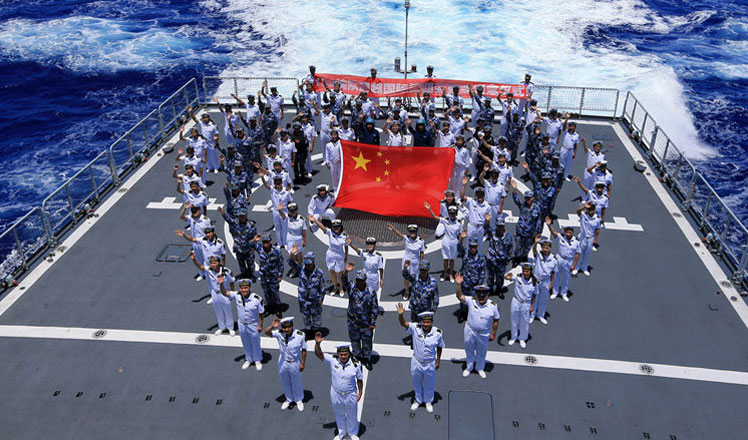Tribunal ruling not to have impact on China
Updated: 2016-07-12 09:07
By Zhu Feng(China Daily)
|
||||||||
 |
|
Missile destroyer Guangzhou launches an air-defense missile during a military exercise in the water area near south China's Hainan Island and Xisha islands, July 8, 2016. Chinese navy conducted an annual combat drill in the water area near south China's Hainan Island and Xisha islands on Friday. [Photo/Xinhua] |
The Arbitral Tribunal in the South China Sea arbitration will pass its ruling on July 12 on a case filed by the Philippines against China over a dispute in the South China Sea. Anticipating an unfavorable ruling, China's Foreign Ministry spokesman Hong Lei reiterated on Friday that Beijing will not accept it no matter how much diplomatic pressure is put on it.
The ruling is likely to have a variety of diplomatic implications for Asia-Pacific affairs. The United States, Japan and some ASEAN member states that have maritime disputes with China would like it to accept the ruling, which they believe is the most convenient way of encroaching upon China's sovereignty and maritime interests in the South China Sea.
Beijing has to stay alert to such dangers, for they could deal a major blow to its legal status in the South China Sea, be it in reclamation work or territorial claims. Beijing has to stick to its stance of not acknowledging or accepting, let alone implementing, the arbitral tribunal's ruling, simply because it will be illegal and thus null, and void.
But having made plenty of diplomatic, political and military efforts to hype up the arbitration during the past three years, the US will not sit idle while China tries to safeguard its lawful rights. Such are their differences on the South China Sea issue that many fear they could lead to a military conflict.
But China has no option but to defend its lawful rights. The South China Sea dispute between Beijing and Manila is essentially about territorial claims and maritime delimitation. Thanks to the US' abrupt intervention and the support of its allies, including Japan, Australia and some European countries, the Beijing-Manila dispute is being used as a bargaining chip in a strategic contest between the major powers in the Asia-Pacific region.
As President Xi Jinping declared in his speech on July 1 to mark the 95th anniversary of the founding of the Communist Party of China, Beijing will not use the threat of force nor will it flaunt its military power unnecessarily. This demonstrates not only China's determination to protect national interests but also serves as a warning to non-regional players such as the US.
Xi's remarks were echoed four days later by former State councilor Dai Bingguo, who said at a meeting in Washington that the tribunal's ruling would be "nothing but a piece of paper".
Once issued, the ruling will serve as a barometer of future China-US relations, but it is not likely to lead to a military conflict because it will not be good for either side and neither wants to escalate the already high tensions in the South China Sea.
Beijing should not only keep a close eye on countries that put military pressure on it to accept the arbitral tribunal's ruling, but also take measures to challenge the tribunal because it has exceeded and abused its powers by dealing with a case it has no jurisdiction over.
China and the US, on their parts, should exercise restraint and seek ways to reach a compromise on the South China Sea issue, because it does not define their bilateral ties. In particular, Washington should not overreact or overstate what the ruling stands for. More importantly, the fact that newly elected Philippine President Rodrigo Duterte has hinted that Beijing and Manila deserve better ties could be a silver lining in bilateral exchanges irrespective of the outcome of the tribunal's ruling.
The author is a professor and executive director of the China Center for Collaborative Studies of the South China Sea at Nanjing University.
- Philippine, Japan coast guards to hold exercise off Manila Bay
- Dozens more arrests in Louisiana after leaders warn against protest violence
- South China Sea Issue ABC
- South China Sea Issue ABC: Why the Philippines' unilateral initiation of arbitration is against international law?
- EU: Strenghten partnerships to stop economic woes
- Fresh killings in Indian-controlled Kashmir clashes raise death toll to 21

 Gettinig to know South China Sea Issue
Gettinig to know South China Sea Issue
 Ronaldo-less Portugal wins Euro 2016 title
Ronaldo-less Portugal wins Euro 2016 title
 Chinese navy fleet joins RIMPAC 2016 open day
Chinese navy fleet joins RIMPAC 2016 open day
 Staying cool at the zoo amid Shanghai heat wave
Staying cool at the zoo amid Shanghai heat wave
 Tibet through the lens of China Daily reporter
Tibet through the lens of China Daily reporter
 On the front lines of the flood battle in China
On the front lines of the flood battle in China
 Griezmann scores twice to lift France into Euro final
Griezmann scores twice to lift France into Euro final
 Life goes on in flooded Wuhan
Life goes on in flooded Wuhan
Most Viewed
Editor's Picks

|

|

|

|

|

|
Today's Top News
Ministry slams US-Korean THAAD deployment
Two police officers shot at protest in Dallas
Abe's blame game reveals his policies failing to get results
Ending wildlife trafficking must be policy priority in Asia
Effects of supply-side reform take time to be seen
Chinese State Councilor Yang Jiechi to meet Kerry
Chinese stocks surge on back of MSCI rumors
Liang avoids jail in shooting death
US Weekly

|

|









